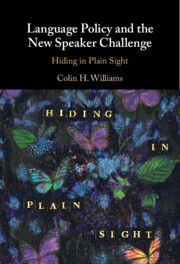Book contents
- Language Policy and the New Speaker Challenge
- Language Policy and the New Speaker Challenge
- Copyright page
- Contents
- Figures
- Tables
- Acknowledgements
- 1 The Emergence of the New Speaker Phenomenon
- 2 Popinjays, Pragmatism and Policy: A New Speaker Triptych
- 3 Wales: Normalised Expectations
- 4 Scotland: Cautious Consideration
- 5 Ireland: Tempered Acceptance
- 6 The Basque Autonomous Community and Navarre: Enthusiastic Endorsement
- 7 Catalonia and Galicia: Unalloyed Support?
- 8 The Policy Community and Recommendations on New Speakers
- 9 Conclusion: Contemporary Challenges
- Book part
- Bibliography
- Index
4 - Scotland: Cautious Consideration
Published online by Cambridge University Press: 02 February 2023
- Language Policy and the New Speaker Challenge
- Language Policy and the New Speaker Challenge
- Copyright page
- Contents
- Figures
- Tables
- Acknowledgements
- 1 The Emergence of the New Speaker Phenomenon
- 2 Popinjays, Pragmatism and Policy: A New Speaker Triptych
- 3 Wales: Normalised Expectations
- 4 Scotland: Cautious Consideration
- 5 Ireland: Tempered Acceptance
- 6 The Basque Autonomous Community and Navarre: Enthusiastic Endorsement
- 7 Catalonia and Galicia: Unalloyed Support?
- 8 The Policy Community and Recommendations on New Speakers
- 9 Conclusion: Contemporary Challenges
- Book part
- Bibliography
- Index
Summary
Scotland has low number of Gaelic speakers and as a consequence the addition of new speakers to the total mix of interlocutors is far more significant. However, the Gaelic language figures far less prominently as an element of both Scottish identity and public investment. Accordingly, with far fewer agencies and actors involved it may be easier to discern the role which the new speaker concept plays in policy discourse and resultant interventions. One complicating factor is the lack of a shared perspective on which elements should be prioritised in Gaelic language promotion and policy. On the one hand there are proponents who argue that as the Gaelic communities are in crisis all efforts should be prioritised into stabilising and sustaining language transmission within these atrophying communities. Others acknowledge the perilous state of traditional communities but argue that support is needed wherever Gaelic is present and elements such as Gaelic-medium education, the media and opportunities for new speakers to flourish also deserve attention. Both perspectives are reflective of what may be called the beleaguered self and contain a fair number of non-cognitive emotional predispositions which colour the rational debate on what is to be done. Consequently tension, disagreement, anger, grief and recrimination can come to shape the various discourses surrounding language policy. In a large-scale language community such fears can be absorbed as part of the general cut and thrust and may not presage any lack of mutual respect and constructive dialogue. But in a small, marginal context such tensions can lead to institutional polarisation between contending agencies and render the central thrust of language promotion less effective.
Keywords
- Type
- Chapter
- Information
- Language Policy and the New Speaker ChallengeHiding in Plain Sight, pp. 110 - 153Publisher: Cambridge University PressPrint publication year: 2023



